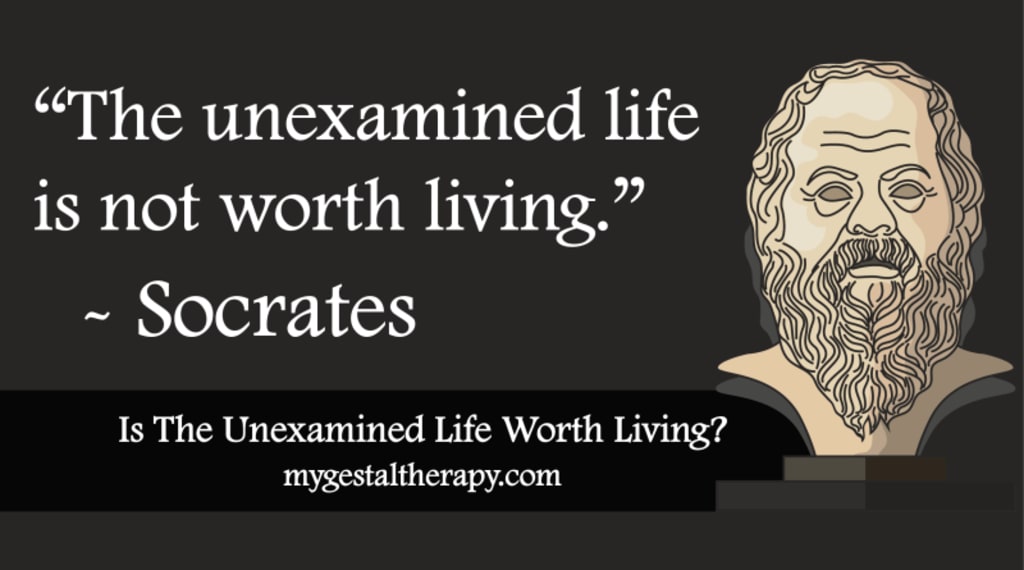Here’s Why The Unexamined Life is Worth Living
Explaining what the examined and unexamined life is

The widely known ancient Greek philosopher Socrates once said: “the unexamined life is not worth living for men.”
Notice that the philosopher was restricting this to men; in fact, the ancient Greek society was too sexist at the time, so much that women had a status slightly higher than that of slaves.
Let’s not dwell a lot on this, since we can agree that most don’t agree with this restriction. That’s a story for another time. Instead, let’s focus on the more popular part of the quote, “the unexamined life is not worth living.” – Socrates
What is an Examined Life?
For Socrates, an examined life was about spending as much time as possible engaging in life’s most important subjects, like those of justice, virtue, piety, truth, among others.
An examined life involves spending time with ourselves and others talking about these concepts to try and get a better understanding of them, and how we should apply them in our lives.
In today’s modern world, the alternative of an examined life would be to think hard about what we value about life, and what we are doing with ours.
What are the most important things in life?
For Socrates, the most important concepts of life were wisdom, knowledge, piety, etc. For most of us, those concepts could be completely different since we are living in a very different world, 2500 years later.
When thinking about the examined life, it comes to mind that to make life worth living, we should be leading a life we enjoy to the fullest. To enjoy life the most, we should engage in activities that bring us fulfillment.
So, we should figure out what gives our life the most meaning, and then focus on that, whether it is helping others, building a family, spending time with loved ones, or simply becoming the best at something, like a sport or the like.
What is a Life not Worth Living?
In contrast, a life that is not worth living is one that would involve a lot of suffering. Bioethics describes this kind of life as lacking hope and enjoyment, as well as being in a state of constant suffering and unbearable pain, or below the “zero line.”
However, not engaging in self-examination doesn’t necessarily equal a life that is not worth living. In fact, many people don’t engage in self-examination, yet live incredibly worthwhile lives.
For example, someone who spends their time volunteering to help the less fortunate, building houses, or taking care of disabled people, someone who wakes up every day in the morning with enough enthusiasm and energy to change the world, is indeed living a worthwhile life.
Imagine this kind of person that spends all of their time helping others, but don’t have time for Socrates, Plato, and other philosophers. Maybe this person is helping save hundreds of lives from starvation, among other things, yet doesn’t have time for examining the nature of virtue, justice, and so on.
What Kind of Life is Worth Living?
We can all agree that a life without constant suffering and unbearable pain is still worth living. Imagine that such life brings any sort of satisfaction, like someone who dedicates themselves to rescue animals and stop them from confronting death in so-called “kill shelters,” where they euthanize the animals after a while (usually six months) if no one adopts them.
The person that engages in this kind of endeavor is an empathetic person that enjoys the accomplishment of saving a few poor souls. We can assume that said individuals should be enjoying themselves when attaining their goal, while sometimes suffering when they can’t succeed. Just like any other life, there are ups and downs, and when the downs are crushing the ups, then life is not worth it.
If life has sufficient ups to satisfy a person, then it is worth it.
Does The Unexamined Life Entail Suffering?
In order for the unexamined life to be unworthy, it would need to entail a lot of suffering and pain, more than satisfaction and wellbeing, since we concluded that this is the kind of life that is never worth it.
Now, since the unexamined life is not necessarily full of suffering, we can safely assume that it is worth living an unexamined life. In some cases, the unexamined life is better than the examined life.
So, what did Socrates really mean?
The philosopher was probably misunderstood, like the Oracle of Delphi often was.
An Alternative Interpretation to Socrates Dictum
Professor Richard Kraut wrote an article in 2007, called “The Examined Life.” In this article, he presents an alternative interpretation of Socrates’s affirmation.
The professor goes to the original text in Greek and finds the word “biotos,” which can be interpreted as “to be lived.” So, it may be that Socrates meant “the unexamined life is not to be lived,” which is quite different from the original quote that we all know.
By asserting that the unexamined life is not to be lived, the philosopher may be warning us that we are missing something if we skip the examination. The unexamined life is something to be avoided. It is a plus, an extra to live an examined life, it is the ideal thing to do, though not required to live a good life.
What is Socrates’s Message Then?
Socrates is saying that if we don’t engage in self-examination, we are missing something of value, but it doesn’t mean that we shouldn’t live our lives.
Just like aesthetic appreciation, music, among other things, the examination of one’s life brings something extra to the table, it adds more value, yet it is not an obligation.
There are characters in the Platonic dialogues, which are a great example of people who lack self-examination. The actions of these people are unwise, precisely because of the lack of the examined life.
Euthyphro’s Case
Socrates once encountered his old friend Euthyphro, in court, and asked him what he was doing there, to which Euthyphro responded:
– “I’m here to prosecute my father.”
Socrates says: “why would you prosecute your father?”
Euthyphro answers: “because he killed one of our employees, and I consider that to be murder.”
Socrates replies: “you must have a lot of confidence about your knowledge of right and wrong and be sure of it in order to do something so bizarre as to prosecute your own father for murder.”
Euthyphro responds: “yes, I know the difference between right and wrong, and that’s why I’m confident of what I’m doing here.”
Socrates then proceeds to question his friend, and about the nature of his beliefs, confidence, and what makes something right and wrong. In a short time, he helps Euthyphro realize how little he knew about these subjects, and that he was not clear about his judgment. His understanding of right and wrong was based on confusion.
Euthyphro’s story is an example of someone whose acts would result in total chaos because of the lack of ethical knowledge, which could’ve been avoided with enough self-examination.
The Benefit of an Examined Life
An examined life is not necessary, and any life could be worth living without examination. However, by engaging in self-examination, we avoid great mistakes like the one that Euthyphro was about to make in court.
The Ring of Gyges
Take the famous dialogue of “The Republic,” for example, in which Glaucon considers some aspects about the ring of Gyges, which will make you invisible if you wear it.
Glaucon admits that he’d be awfully tempted to put on that ring since he could steal a lot of things, have his way in all kinds of matters, what’s to keep him from grabbing the ring, and succeed in life? He tells Socrates that he is not sure that it is the right thing to do, and asks him why.
Imagine that you have the contemporary version of the ring, a device that allows you to cheat in modern life, like in the Playstation game of “Watch Dogs.” Suppose that this device allows you to hack databases and add more money to your bank account without being detected nor leaving any traces.
If you were sure that there would be no consequences for using this device to get ahead of everybody else, you might be tempted to use it one day.
Socrates’s Answer to Glaucon
Socrates says that if you were to get everything you want through these illegitimate methods, even if you don’t get caught, those things that you acquired won’t be worth very much to you since you didn’t earn them.
There’s a lot of wisdom and truth in Socrates’s words. If you’ve ever spent an entire Sunday at home, watching tv, playing video games, ordering food, and doing anything that pleases you without any concern, you would’ve noticed a few things. At some point, you will get bored and tired of these things, and you will feel like something is missing, that something is the sense of fulfillment that comes with earning what you have.
We all take pride in our accomplishments, that is human nature. We feel satisfied when we succeed, and we feel even better when we make progress towards a goal, not necessarily attaining the goal, but getting closer to it makes us feel great.
We all need to feel that we deserve what we have, one way or another. If you don’t work or feel like you’ve worked hard enough, you won’t be able to enjoy the fruits of your labor. You’ll feel as if you didn’t deserve it.
Modern Answer To Glaucon’s Question
Now, you will probably ask, well, what about criminals who get rich and still enjoy their rewards? Well, they do get rich with illicit activities, yet it is a lot of work. Even committing a crime is hard work, even Pablo Escobar, the most widely known drug lord needed to work a lot to achieve his goals, he needed to stick his neck out, put his family, friends, and himself at risk to get somewhere.
So, why not engage in illicit activities like these criminals, why not take a shortcut? Because it will feel less rewarding, and you will suffer the consequences as Escobar did, shot like a defenseless dog in a roof, surrounded by DEA agents pointing guns at him. It cost him his values, his family, and ultimately his life.
In some cases, you could still succeed in some areas of life while doing immoral and illicit things, and you may even enjoy what comes off it. However, deep down, you’ll feel like something’s missing, you will miss the feeling of fulfillment that people who work hard to accomplish their goals earn after failing and failing again to succeed at the end due to perseverance and honest work.





Comments
There are no comments for this story
Be the first to respond and start the conversation.